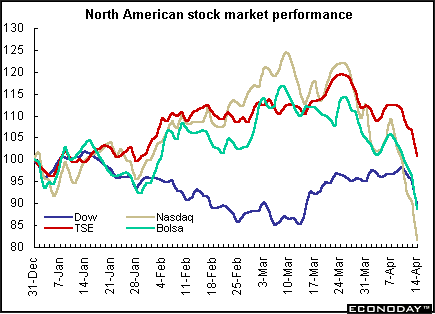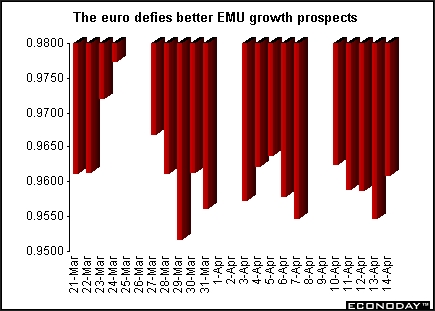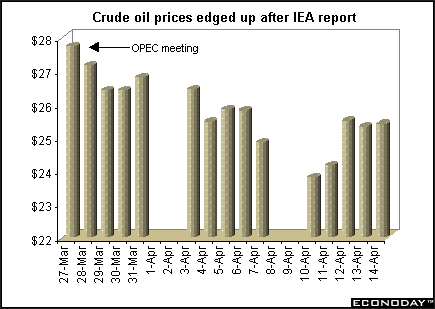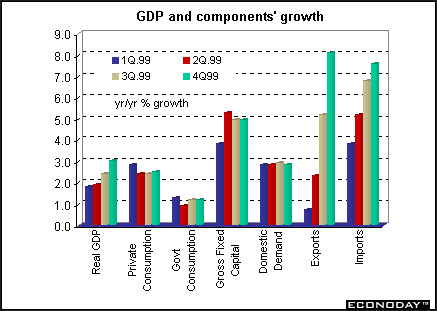| Previous Articles |
|
The brunt of Friday's carnage in North American equity markets occurred too late to have an effect on Asian trading. But European markets, already softened by prior losses in the U.S., were hit in afternoon trading, extending their downward slide. Analysts had complained that the markets were not paying enough attention to economic indicators. That changed with a vengeance on Friday when the U.S. consumer price index rose more than expected and the markets plummeted in response.
Europe and Britain
The FTSE-100 index faltered on worries that the drop in the TMTs - technology, media and telecommunications stocks - might be the start of a more severe and fundamental retreat. This in turn began to erode the rather fragile confidence that had built up in the wake of the previous week's turbulence. Dealers were still nursing wounds from those events and remained extremely nervous as the Nasdaq continued its retreat. The week-long erosion in Nasdaq technology stock prices meant that UK technology stocks had only one way to go - down. Initially the drops, by recent standards, were restrained. But as the sell off continued, it spread to old economy blue chip stocks as well. The FTSE-100 continued to hemorrhage after lunch Friday when it became clear that Wall Street was off to a shaky start. The Frankfurt DAX and Paris CAC endured a dismal session on Friday as well. Further selling in technology, media and telecommunication stocks kept the lid on morning activity, while the higher than expected U.S. inflation data, which stoked interest rate fears, sent markets further lower in afternoon trading. On the week, the DAX dropped 307 points or 4.1 percent to end at 7215 while the CAC fell 242 points or 3.8 percent to end the week still above the 6000 level at 6066. Asia
The Nikkei rallied to a three year high on Wednesday after the Bank of Japan raised its forecast for growth. Some domestic stocks have such low prices that investors will buy them at the slightest hint that the economy's improving. The Nikkei seemed to be rebuffing pressures from overseas for the most part. However, the downward pull from abroad was too much and the index fell on both Thursday and Friday. Nevertheless, the Nikkei rose 182 points or 0.9 percent to end the week at 20,435. The Hong Kong Hang Seng sank everyday but Wednesday as the drop in the Nasdaq sent shivers through the local market. Investors scurried away from the volatile high technology stocks. Analysts said that the Hong Kong market was being held hostage by the Nasdaq. The Hang Seng Index is down 4.8 percent since the start of the year. On the week, the Hang Seng lost 799 points or 4.7 percent to end at 16,143. The South Korean Kospi had its best day of the week on Monday when the index rose almost 4 per cent helped by optimism that the planned June summit with North Korea would lead to business opportunities north of the border. The Kospi has plummeted 22 percent since the start of the year. Americas
Currencies:
Waiting, Wondering Demand for yen was dampened by concerns that Japan's central bank would intervene again to keep the currency from appreciating further before the G-7 meeting. At the last two G-7 meetings, ministers said in their joint statements that they shared Japan's concern over a strong yen and its adverse impact on the Japanese and world economies. Japanese exporters, who often sell dollars to bring home overseas earnings when the dollar rebounds, may cap the dollar's gains against the yen. When the dollar rises, exporters get more yen converting dollars into their home currency.
The euro fell to its lowest level in two weeks following the European Central Bank's decision to leave its main lending rate unchanged at 3.5 percent. The euro's decline was limited, however, as investors and traders waited to see if the G-7 ministers would address the currency's weakness. The euro revived slightly on Friday because of the drop in U.S. equity markets. European leaders have continually played down the need for coordinated international moves to bolster the euro and have suggested that this time won't be any different.
Group
of Seven meets Central
Banks During the press conference that followed the meeting, ECB President Wim Duisenberg disagreed with the unsolicited advice from the International Monetary Fund, which urged the ECB not to tighten credit too quickly lest it stop an accelerating economic recovery in its tracks. He also signaled his determination to continue with the lending rate increases that it began in November. Duisenberg vowed to remain vigilant to an array of inflation risks and to take appropriate action if and when required. He said the weak euro and high crude oil prices had pushed the EMU's inflation rate up to the central bank's 2 percent limit. The Bank of Japan left monetary policy unchanged after its regular board meeting. The decision was by majority vote. The Bank of Japan upgraded its monthly assessment of the economy to say that it now sees "distinct" signs of a recovery and that even private demand is showing signs of picking up. In the minutes of the Bank of Japan's March 8th meeting, some members recognized that fundamental changes in the economy and the delayed effects of the stronger yen meant that some deflation might be healthy. But most members of the Bank of Japan's Monetary Policy Board agreed that deflationary concerns had not yet been dispelled and rates should be kept unchanged. Many members expressed the view that the economy was in most respects following the expected path to recovery. Specifically, production had increased reflecting the rise in external and public demand, prompting growth in corporate profits and in turn stimulating firms' spending activities. However, members said that it wasn't yet clear that the recovery was self-sustaining. Oil
prices slide While OPEC's March 29th Vienna production accord increased output targets by 1.72 million barrels per day, the actual increase will be less, because the OPEC 10 (OPEC excluding Iraq) were already producing 1.25 million barrels a day above the March targets, the report said. Iran did not take part in the production agreement but said it would raise output, as well. The agency also revised up its non-OPEC supply forecast for this year by 200,000 barrels a day.
May crude fell below $24 a barrel for the first time in three months last week as OPEC producers continued to produce more oil after cartel members agreed to return production to pre-March 1999 levels. Energy prices fell following the OPEC meeting. Negative sentiment regarding poor OPEC March compliance to quotas and expectations of greater supply ahead reinforced the downward price pressures. Indicator
scoreboard
Fourth quarter gross domestic product rose 0.9 percent on the quarter and 3.0 percent on the year. A downward revision in domestic demand was offset by an upward revision in net exports. For the year 1999 GDP was revised up to 2.3 percent from 2.2 percent.
Germany - January trade balance was revised down to a surplus of DM5.2 billion compared to a surplus of DM7.0 billion reported earlier. Exports are 19.1 percent above the level of a year ago, with particularly strong gains in trade with China, the United States and Russia. Exports to China were particularly strong, up 26.0 percent. Exports to the United States rose 22.5 percent on the year while exports to Russia rose 21.3 percent on the year. Exports to EMU countries rose 21.0 percent from a year ago. February unadjusted merchandise trade surplus stood at DM13.1 billion, up from the revised DM10.7 billion surplus posted in the same month a year earlier and up from the DM5.2 billion surplus posted in January (revised down from a DM7.0 billion surplus). February exports were 19.1 percent above a year earlier, while imports were up 18.5 percent on the year. German exports posted double-digit increases to all major trading regions in February compared to a year earlier. February retail sales rose a real 3.7 percent when compared with last year. Strong February retail sales had been anticipated because winter sales took place mostly in February this year instead of in January. Also, this year's February had one additional shopping day compared to February 1999. Most major sales subcategories increased compared to a year earlier. France - March consumer price index rose 0.4 percent as continued increases in oil prices (2.8 percent) and a sharp rebound in apparel prices (5.6 percent) due to the end of seasonal discounts were partly offset by declines for fresh food (-0.7 percent) and other services (-0.1 percent). The seasonally adjusted CPI rose 0.3 percent on the month for an annual increase of 1.6 percent. These results must be taken with caution, since the two week delay in the start of the winter discount period makes seasonal adjustments difficult in the first quarter. Italy - February seasonally and workday adjusted industrial production rose 1.5 percent and 2.8 percent when compared with last year. Output growth by product sector was strong almost across the board in February, with the only drop coming in the mineral extraction category. Spain - March consumer price index was up 0.4 percent on the month and 2.9 percent on the year. The rise was mainly due to a strong gain in energy prices, which were only slightly offset by flat food prices. Fuel and gas prices increased 3.2 percent on the month and were up 22.7 percent on the year, while energy products rose 2.5 percent on the month and 15.9 percent on the year. Core consumer prices, excluding energy products and non-processed food, were up 0.3 percent on the month and 2.1 percent on the year. Britain - March producer output prices rose 0.5 percent because of increases in excise duties and the higher crude oil costs. Non-seasonally adjusted output prices were up 2.3 percent on the year. The jump was mostly due to rise in the price of petroleum products, tobacco and alcohol. Seasonally adjusted core output prices excluding food, beverages, tobacco and petroleum rose 0.1 percent on the month and 0.6 percent on the year - the highest since December 1996. Seasonally adjusted input prices rose 0.8 percent on the month and by 13.8 percent on the year. Business optimism among financial services firms continued to improve in the first quarter although there are concerns about the year ahead, according to the Confederation of British Industry's latest financial services survey business. The optimism balance rose to 36 percent from 21 percent in December. This is the fifth survey in a row to show an increase in optimism and it shows the sharpest increase since June last year. Asia February key private sector machinery orders received by Japanese manufacturers fell a seasonally adjusted 2.5 percent. The orders exclude volatile ones for ships and from power companies. The key orders are viewed as a leading indicator of corporate capital investment six to nine months ahead. Total seasonally adjusted orders fell 6.1 percent from the previous month. February's current account surplus rose 59 percent and was up 24.95 percent on the previous year. The trade surplus rose 49.07 percent on month and up 16.24 percent on the year. Exports rose 13.9 percent on the year while imports rose 11.4 percent. BOTTOM LINE
Release dates are subject to change. For U.S. data releases, see this week's Simply Economics. |
|||||||||||||||||||||||||||||||||||||||||||||||||||||||||||||||||||||||||||||||||||||||||||||||||||||||||||||||||||||||||||||||||||||||||||||||||||||||||||||||||||||||||||||||||||||||







